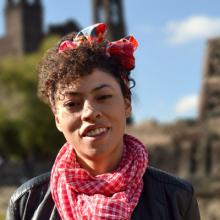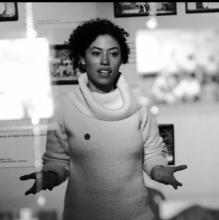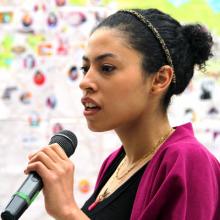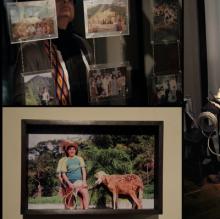Dora Alejandra Gaviria Serna
Why did you decide to pursue a graduate degree?
For the past 15 years, my academic, professional, and volunteer work has focused on the defense of human rights, peacebuilding, the reconstruction of historical memory, truth-telling, and aesthetic, artistic, and cultural expressions amidst armed conflicts. From the 2000s onwards, I have taken on leadership roles where I strived to share my knowledge and work collaboratively with communities impacted by violence. These experiences and my work in the field of human rights became foundational and critical motivators for the advancement of my scholarly career and program of research. I realized the importance of linking my activist work with a process of academic reflection which enables me to have a deep understanding of the social, historical, and political dynamics of armed conflicts and mass violence, their structural and long-term effects, the everyday survival practices and the strategies to cope and transform the present. Thus undertaking doctoral studies and developing my program of research is a milestone in my career because it allows me to have the time and space to continue strengthening and consolidating my reflections, questions, projects, and proposals from theoretical, interdisciplinary, and activist fields.
Why did you decide to study at UBC?
I decided to pursue my doctoral studies at UBC because The Social Justice Institute is an ideal place for the advancement of my research, as it provides me with a stimulating interdisciplinary academic environment and with the theoretical and methodological foundations to advance my work. The Institute’s approach, allows me to develop doctoral studies as an academic process strongly connected and committed to our current world and the possibility of taking action. In addition, my research supervisor, Dr. Pilar Riaño-Alcalá is a world-renowned scholar in the study and practice of historical memory reconstruction in contexts of mass violence. Her focus is on communities affected by violence, and her extensive experience in arts-based and Participatory Action Research methodologies in Latin America is extremely relevant to my research and approach.
What is it specifically, that your program offers, that attracted you?
The Memory & Justice Studies research stream, led by my supervisor Dr. Pilar Riaño-Alcalá and committee member Dr. Erin Baines, have developed innovative approaches to questions on memory and justice in contexts of conflict that will greatly strengthen my analysis. Additionally, the opportunity to be the Project Coordinator for the Transformative Memory Partnership Development Grant, co-led by Dr. Riaño-Alcalá and Dr. Baines which fosters an international network of scholars, artists, and community-based memory workers that work in Canada, Colombia, Indonesia, Uganda, and Peru. Serving as a Coordinator for this project has provided me with the unique opportunity to learn about memory and justice studies in other latitudes.
What was the best surprise about UBC or life in Vancouver?
The possibility of connecting, building community, and bonds of friendship with various international students, especially Latin Americans, who are in Vancouver has been one of the things I value most about this experience.
What aspects of your life or career before now have best prepared you for your UBC graduate program?
Having had over 20 years of working with communities affected by armed conflict has provided me with the experience and skillset to thrive in my doctoral program. The ability to connect, empathize and organize with diverse communities has given me a strong foundation to conduct participatory action-based research and to engage with real-life issues through an academic lens.
What do you like to do for fun or relaxation?
I like to enjoy the outdoor activities and spaces that this city and its surroundings offer us, such as its parks, woods, mountains, and beaches.
What advice do you have for new graduate students?
Doctoral studies is a demanding process, that is why I consider it important to try to maintain a balance in life. Take time for yourself to share with others and to relax.



